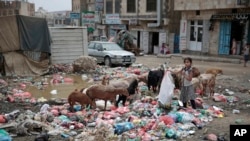The Saudi-backed government that rules parts of Yemen said Tuesday that it urgently needed a $2 billion deposit pledged by Riyadh in November to stabilize a currency that hit new lows this week and save its people from starvation.
Yemen has been divided by nearly three years of civil war between an internationally recognized government based in the south and the Iran-aligned Houthi movement that controls the north, including the capital, Sanaa.
The conflict has unleashed a humanitarian crisis, including a deadly cholera epidemic, and an economic collapse that the United Nations says has the potential to cause one of the deadliest famines of modern times.
Authorities sought to boost liquidity by printing money, but the rial plunged from 250 to the dollar to 350 after the first batch of newly printed notes was rolled out last year. The rial traded for 440 to the dollar by year's end and this week was near 500.
A large deposit from Saudi Arabia would give the authorities the financial means to stabilize the currency and make it possible for people to buy food, the government says.
"First and foremost is saving the Yemeni rial from total collapse, now and tomorrow. Saving the rial means saving Yemenis from inevitable hunger," Prime Minister Ahmed Obeid bin Daghr said on Twitter.
Stepped-up communications
State news agency Saba quoted government spokesman Rajeh Badi as saying on Monday that the authorities were "intensifying communication" with the Saudis, to "expedite the completion of the Saudi depository procedures."
Saudi officials did not immediately respond to a request for comment about the funds.
President Abd Rabu Mansour Hadi announced on November 11 that Riyadh had agreed to deposit $2 billion into Yemen's central bank to shore up the rial and secure shipments of badly needed fuel.
Hadi's government officially moved the central bank in 2016 from Sanaa to Hadi's base in Aden. A separate branch still operates in Sanaa under the Houthis.
Both branches suffer from depleted reserves, but they have played a role in mitigating economic pain by paying some public sector salaries, as soaring prices threaten to push basic commodities out of reach for many Yemenis.
The Aden authorities accuse the Houthis of plundering the bank's foreign reserves in Sanaa to fund their war effort. The Houthis and the Sanaa bank deny those charges.





